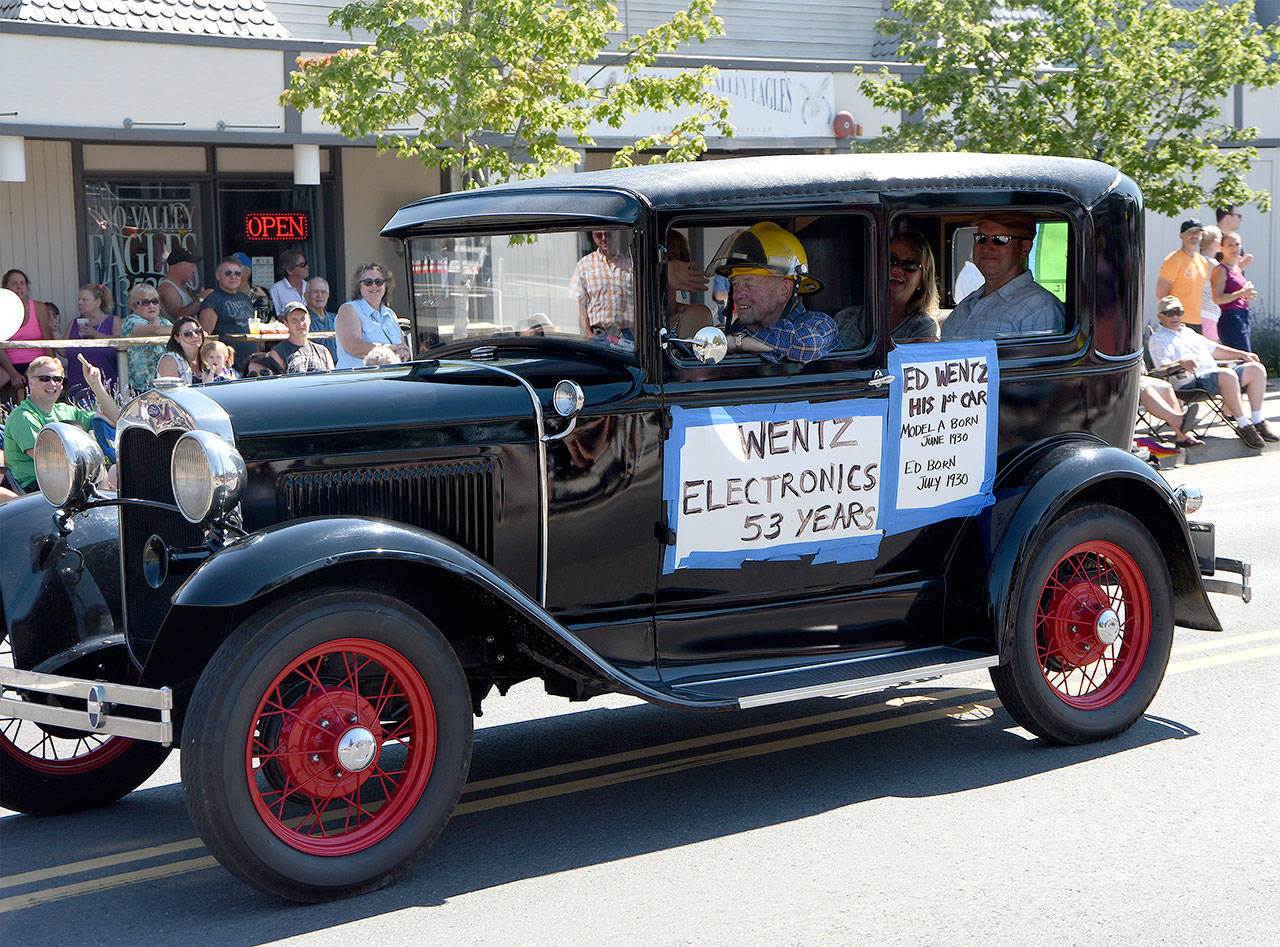After 63 years of tinkering, including four in retirement, Ed Wentz might reasonably be expected to have run out of things to do in his Snoqualmie home. Not a chance.
“He’s always busy,” says his daughter, Judi Wentz, who moved in with him six years ago when he developed health problems. “Just just loves to tinker and fix things, and there’s just so much stuff, 50 years worth in the garage.”
He’s got another pretty important project on the schedule for this weekend, when he serves as Grand Marshal in the Railroad Days parade, 11 a.m. Saturday on Railroad Avenue.
Wentz has lived in Snoqualmie for 63 years, served in the U.S. Naval Reserve for 18 years, served two terms on the Snoqualmie City Council and for 37 years as a volunteer firefighter, eventually becoming assistant fire chief. He did electronics repair for decades, first with Shinner Electric and later for his own company, Wentz Electronics, and spent nearly all of his time, you guessed it, keeping busy.
In a 2013 story on Wentz’s retiring from the business and handing the keys to the shop over to sons Bob and Russel, we learned that he has owned a vacation home on Whidbey Island since 1964 but has never spent a full week there.
“Dad likes to keep busy,” Russell explained back then. “He’s not a guy who likes to be idle.”
He never has been that guy. Judi, the oldest, remembered moving to Snoqualmie as a child.
“Oh, my gosh, when we moved here, there were all these old people living around us,” she said, “and he helped them all.”
Helping people
Not only did he fix their electronics — “he loves fixing things,” Judi said — but he kept them running during power outages. Judi recalled that the family had a generator, which he’d use to power the family’s freezer for a couple of hours, then take it to a neighbor’s house to power theirs, and so on, around the neighborhood.
At the time, he was working for Shinner Electric, but he went into business for himself with Wentz Electronics in 1962, in a roundabout way.
While at Shinner’s he had been recruited by the Seattle company Tele-Car Communications in 1959; shortly after Wentz signed on with that company, it was sold to a big conglomerate that bought up most of the radio shops in the Seattle area.
Ed was the company’s Valley man, working out of his shop in Snoqualmie (the house next door to where he lived) , and working with big customers like Weyerhaeuser, Cadman gravel, and several towing companies.
He’d mail back his reports, and once in a while drive to the city to stock up on parts.
“I was the only one making any money for them, so they never bothered me,” he recalled.
But 18 months in, Ed and other employees got word that their company was going out of business.
“The first thing I did was check with the big accounts,” Ed said. They told him, “’You’re our radio company. We’ll stay with you,’” he recalled. That was the start of the Wentz family’s independent business.
“It was easy to swing into full time,” he recalled. “Working for myself made it worth working hard.”
The heart of Ed’s business was maintaining the radios that kept local loggers, truckers and businesses connected.
In his blue van, Ed rolled out to logging camps to make sure the safety radios were working properly. He built a special workbench in his van, where he could take apart and fix a radio on the road.
“My philosophy is, no matter how small a company I was, the customer should not expect any less service than the largest radio company. Maybe better service,” he said.
Snoqualmie history
He also helped save the siren from the old fire station, demolished in 2007 to make way for a new Snoqualmie City Hall and restored it to working order for a noon alarm which sounded daily until about a year ago.
Although he juggled his demanding business, civic duties and his family responsibilities, he says “There was never any time during the 51 years that I had a goal to retire.”
He has clearly enjoyed everything he’s done, from flying his single-engine Chinook out to emergency repair jobs in logging country, to rewiring the fire station alarms so they would go to some of the primary firefighters’ houses, including his own.
Judi recalled, that emergency calls — mostly aid calls back then — went “to five houses in Snoqualmie, and ours was one of them. So when the call came in, my mom would reach underneath the phone and push these two buttons and that would make the siren go.”
She also vividly recalls her always-skinny father carrying a huge keyring that would bounce on his hip whenever a siren sounded, because he was running to the fire station.
Ed and his wife Chloe, who died 13 years ago, had “a great marriage,” Judi said, with lots of dancing at the fire hall, which they both loved to do.
These days, Ed 87, is not nearly so active, but he will always be busy, with his five children, seven grandchildren, nine great-grandchildren, and his beloved shop cat, Hank.



